

| Judith Blegen (April 27, 1941,
Fayette, Kentucky) is an American soprano, particularly associated with light
lyric roles of the French, Italian and German repertories. Blegen was raised and attended high school in Missoula, Montana, during which time she began voice lessons with John L. Lester, head of the voice department at the University of Montana. She studied first the violin with Toshiya Eto, and later voice at the Curtis Institute of Music in Philadelphia, with Eufemia Giannini-Gregory, and later in Rome, with Luigi Ricci. She made her operatic debut in Nuremberg, Germany, as Olympia in The Tales of Hoffmann, in 1965, where she subsequently sang Lucia, Susanna, and Zerbinetta. That same year, she appeared in Spoleto, Italy, as Mélisande in Pelléas et Mélisande. She made her debut at the Vienna State Opera, as Rosina in The Barber of Seville, in 1968, and the following year appeared at the Santa Fe Opera, as Emily in the premiere of Gian Carlo Menotti's Help, Help, the Globolinks!, a role requiring her both to sing and play the violin. Her New York Metropolitan Opera debut took place on January 19, 1970, as Papagena in The Magic Flute. She sang there over 200 performances of 19 roles, including Marzelline, Zerlina, Nanetta, Sophie, Adina, Gilda, Oscar, Juliette, Blondchen, Gretel, and Adele. She made her debuts at the London Opera House in London, in 1975, and at the Palais Garnier in Paris, in 1977. She appeared on The Tonight Show Starring Johnny Carson on December, 20, 1979, [YouTube image shown below] where she performed the Christmas carol, O Holy Night. 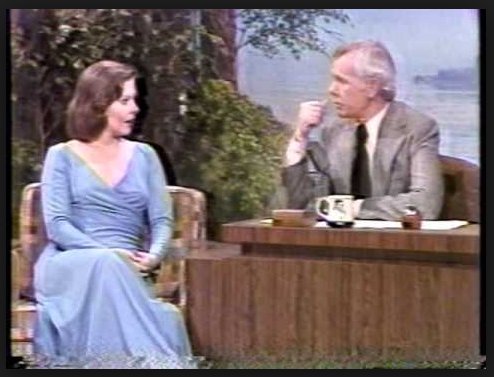
A singer with a radiant voice, polished musicianship, and charming stage presence, she retired in 1991. She is married to former Metropolitan Opera concertmaster Raymond Gniewek. She is a 1983 recipient of the Montana Governor's Arts Award. * * * * * Judith Blegen at Lyric Opera of Chicago 1973 - Rosenkavalier (Sophie) with Ludwig/Dernesch, Berthold,
Sotin, Gutstein,
Merighi, Andreolli,
Zilio, Gordon, Voketaitis; Leitner
1978 - Don Pasquale (Norina) with Evans, Kraus, Stilwell; Pritchard 1979 - Rigoletto (Gilda) with Manuguerra/Elvira/Salvadori, Pavarotti, Gill, Kuhlmann; Chailly 1986-87 [Opening Night] - Magic Flute (Pamina) with Araiza, Nolen, Salminen, Serra, Stewart; Slatkin, Everding -- Names which are links refer
to my interviews elsewhere on this website. BD
|
Some Recordings of Mozart featuring Judith Blegen
|
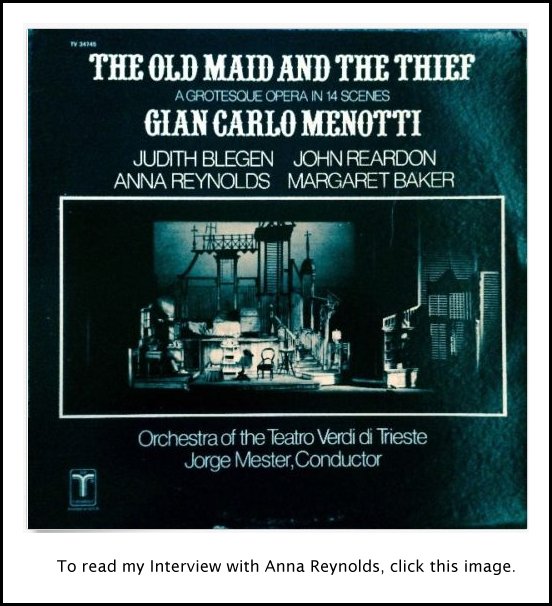 BD: While we’re thinking about contemporary
music let me throw you a curve and ask you about Globolinks.
BD: While we’re thinking about contemporary
music let me throw you a curve and ask you about Globolinks.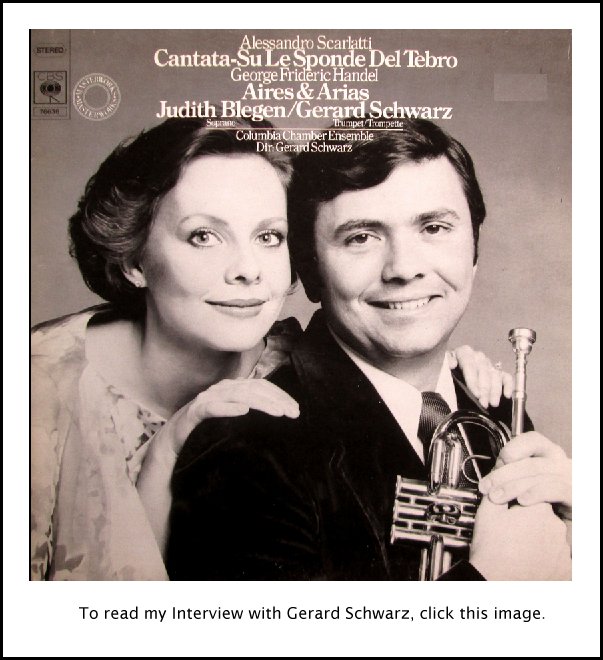 BD: Who is encouraging the young singers
to violate this trust of their voice? Is it the teachers, the impresarios,
the singers themselves?
BD: Who is encouraging the young singers
to violate this trust of their voice? Is it the teachers, the impresarios,
the singers themselves?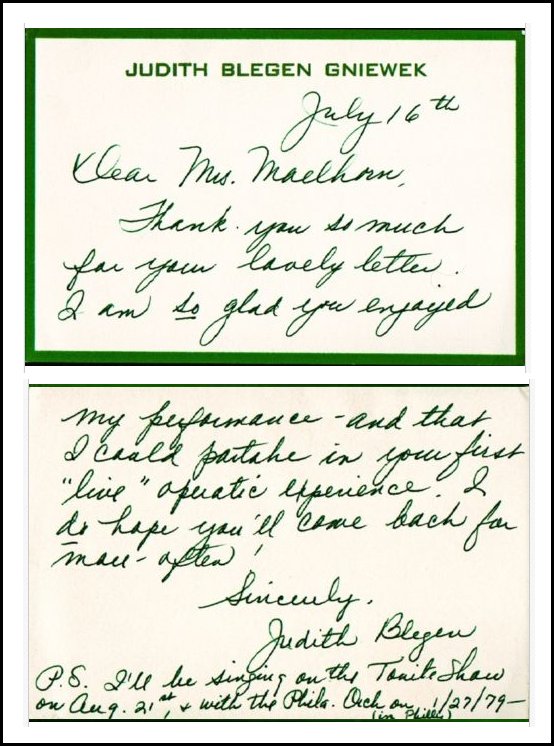 BD: Maybe after you’re through singing you’ll
get back to playing a little bit.
BD: Maybe after you’re through singing you’ll
get back to playing a little bit.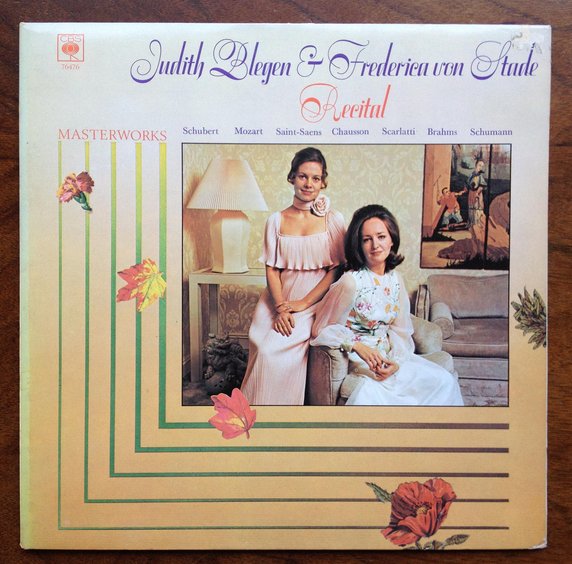 BD: For whom do you sing?
BD: For whom do you sing? JB: Yes. I was at Aix-en-Provence and
it was a production of Magic Flute.
I had just come from my first production of the work which was in Hamburg
with Achim Freyer. He was the designer and stage director, and was
quite an artist. But I thought his production was ridiculous and I told
him so. I got called on the carpet by Dohnányi.
Freyer had complained about me being difficult. So I was very embarrassed,
and apologized immediately to Mr. Dohnányi. I was very sorry
to have offended somebody that deeply. I had said to Freyer, “Das ist mir Wurscht!”
That’s baloney, and maybe in German it’s a lot stronger than I ever realized.
After all, he’s an artist. Designers, directors, and performers,
we’re all artists and I know how sensitive I have always been. I obviously
offended him and he went to Dohnányi and complained about me.
But I stood my ground with Dohnányi, too. I said that I was
sorry, but I just don’t like avant-garde on top of Mozart. I don’t
have anything against avant-garde but don’t combine it with Mozart.
I’m sorry, that’s where I stand. Then in Aix-en-Provence it was not
just avant-garde but it was brutality and cruel, and I felt it was absolutely
untrue and unright. For example, in the fire and water trials of Pamina
and Tamino, his idea of the fire was that I would hold a torch disguised
in my hand. To the audience it looked as though the trial was that
Pamina would put her own hand into the flames. It was so funny because
there was an elevator that came down three stories, and at that point I was
supposed to come out of this elevator with my hand extended, which in reality
was a torch, sort of like the statue of liberty. I would take this
elevator down and get to the bottom, and then I was to take this torch and
put it in this bucket of water to put it out. Then for the water trial,
Pamina was supposed to kneel down at this bucket and put her head in it!
Then one of the armored men was supposed to pretend to hold my head under
this pretend water while I was supposed to writhe my shoulders to demonstrate
that I’m running out of breath and was about to drown. The armored
man would let go of me and I could take my head out of the water just in
time to say, “Ihr Götter,
welch ein Augenblick! Gewähret ist uns Isis’ Glück!”
“Oh Gods, what a moment! Come true is the happiness
of Isis!” We got to that and I just thought,
“That’s ridiculous! I can’t do this! I
won’t do it, period!” Something even more brutal
and cruel than that was before they start do go onto those trials.
Pamina comes out and sings that magnificent, absolutely precious, perfect
phrase, “Tamino mein, oh
welch ein Glück!” That’s the moment she
is saying finally, “Tamino you are mine now, oh what
a glorious happiness!” Again I was up about three
stories high and I was supposed to come through this old-western-type swinging
bar room door. That was the first door which was facing the audience.
Then I was covered by another door up to my neck, and I was to sing that
beautiful phrase from there, covered up to the chin looking down three stories
and across the stage to Tamino who was blindfolded with a black blindfold
with his hands tied behind his back. Then, what really made me break
down on the spot in tears, uncontrollably sobbing so that I absolutely could
not bring a sound out of my throat was that one of the armored men was sitting
in between the two of us on a regular folding chair, leaning back in it
so the front two legs of the chair are in the air. He was grinning
at me, smirking at me, looking back and forth between the two of us.
I remember sobbing that day. I broke down sobbing, and left the stage.
I said, “I’m sorry but this is the end. I’m going
home right now. I’m quitting and I don’t care what the price is but
this I can’t take!” And that’s exactly what
I did. I just left.
JB: Yes. I was at Aix-en-Provence and
it was a production of Magic Flute.
I had just come from my first production of the work which was in Hamburg
with Achim Freyer. He was the designer and stage director, and was
quite an artist. But I thought his production was ridiculous and I told
him so. I got called on the carpet by Dohnányi.
Freyer had complained about me being difficult. So I was very embarrassed,
and apologized immediately to Mr. Dohnányi. I was very sorry
to have offended somebody that deeply. I had said to Freyer, “Das ist mir Wurscht!”
That’s baloney, and maybe in German it’s a lot stronger than I ever realized.
After all, he’s an artist. Designers, directors, and performers,
we’re all artists and I know how sensitive I have always been. I obviously
offended him and he went to Dohnányi and complained about me.
But I stood my ground with Dohnányi, too. I said that I was
sorry, but I just don’t like avant-garde on top of Mozart. I don’t
have anything against avant-garde but don’t combine it with Mozart.
I’m sorry, that’s where I stand. Then in Aix-en-Provence it was not
just avant-garde but it was brutality and cruel, and I felt it was absolutely
untrue and unright. For example, in the fire and water trials of Pamina
and Tamino, his idea of the fire was that I would hold a torch disguised
in my hand. To the audience it looked as though the trial was that
Pamina would put her own hand into the flames. It was so funny because
there was an elevator that came down three stories, and at that point I was
supposed to come out of this elevator with my hand extended, which in reality
was a torch, sort of like the statue of liberty. I would take this
elevator down and get to the bottom, and then I was to take this torch and
put it in this bucket of water to put it out. Then for the water trial,
Pamina was supposed to kneel down at this bucket and put her head in it!
Then one of the armored men was supposed to pretend to hold my head under
this pretend water while I was supposed to writhe my shoulders to demonstrate
that I’m running out of breath and was about to drown. The armored
man would let go of me and I could take my head out of the water just in
time to say, “Ihr Götter,
welch ein Augenblick! Gewähret ist uns Isis’ Glück!”
“Oh Gods, what a moment! Come true is the happiness
of Isis!” We got to that and I just thought,
“That’s ridiculous! I can’t do this! I
won’t do it, period!” Something even more brutal
and cruel than that was before they start do go onto those trials.
Pamina comes out and sings that magnificent, absolutely precious, perfect
phrase, “Tamino mein, oh
welch ein Glück!” That’s the moment she
is saying finally, “Tamino you are mine now, oh what
a glorious happiness!” Again I was up about three
stories high and I was supposed to come through this old-western-type swinging
bar room door. That was the first door which was facing the audience.
Then I was covered by another door up to my neck, and I was to sing that
beautiful phrase from there, covered up to the chin looking down three stories
and across the stage to Tamino who was blindfolded with a black blindfold
with his hands tied behind his back. Then, what really made me break
down on the spot in tears, uncontrollably sobbing so that I absolutely could
not bring a sound out of my throat was that one of the armored men was sitting
in between the two of us on a regular folding chair, leaning back in it
so the front two legs of the chair are in the air. He was grinning
at me, smirking at me, looking back and forth between the two of us.
I remember sobbing that day. I broke down sobbing, and left the stage.
I said, “I’m sorry but this is the end. I’m going
home right now. I’m quitting and I don’t care what the price is but
this I can’t take!” And that’s exactly what
I did. I just left.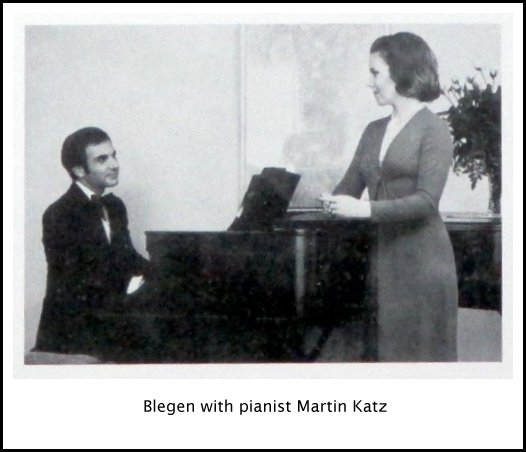 BD: Do you enjoy making recordings?
BD: Do you enjoy making recordings?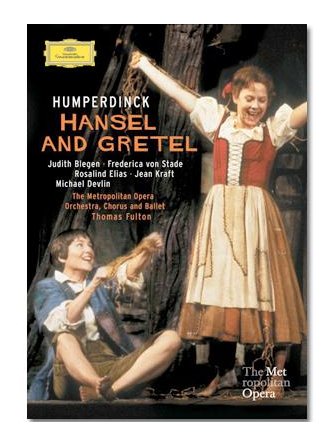 JB: Yes. As a matter of fact, when I did
the video tape of Hansel and Gretel
from the Met, I was sorely disappointed that they hadn’t used subtitles there.
[DVD cover shown at right. Also,
see my interview with Jean Kraft.]
I thought about all my work, and I had just assumed they were going to use
subtitles because on other Live from the Met broadcasts I had seen them.
I was sorely disappointed they didn’t use them for Hansel and Gretel. English is the
most difficult language I’ve ever had to sing in.
JB: Yes. As a matter of fact, when I did
the video tape of Hansel and Gretel
from the Met, I was sorely disappointed that they hadn’t used subtitles there.
[DVD cover shown at right. Also,
see my interview with Jean Kraft.]
I thought about all my work, and I had just assumed they were going to use
subtitles because on other Live from the Met broadcasts I had seen them.
I was sorely disappointed they didn’t use them for Hansel and Gretel. English is the
most difficult language I’ve ever had to sing in. JB: Basically I sketch out what operas I’d like
to accept and how I’d like to plan that out, and then I accept the concert
and other engagements and basically work around that. However, when
I receive an invitation from maestro Bernstein to record The Creation, that just becomes number
one in my mind, in my whole life. [CD booklet cover shown at left.]
As a matter of fact, it was a very difficult thing for me to do because I
really did a job on myself. As far as I’m concerned Lenny’s just a
genius. He is a walking Mozart in every aspect, and what I demanded
from myself was to start from the point of perfection and go from there.
When you go from that attitude, you’re going to lose, period. So I did
a real job on myself. I had to recuperate. I wasn’t myself for
at least four or five weeks after that. If he would invite me for
something else, I just don’t know if I can go through that again.
JB: Basically I sketch out what operas I’d like
to accept and how I’d like to plan that out, and then I accept the concert
and other engagements and basically work around that. However, when
I receive an invitation from maestro Bernstein to record The Creation, that just becomes number
one in my mind, in my whole life. [CD booklet cover shown at left.]
As a matter of fact, it was a very difficult thing for me to do because I
really did a job on myself. As far as I’m concerned Lenny’s just a
genius. He is a walking Mozart in every aspect, and what I demanded
from myself was to start from the point of perfection and go from there.
When you go from that attitude, you’re going to lose, period. So I did
a real job on myself. I had to recuperate. I wasn’t myself for
at least four or five weeks after that. If he would invite me for
something else, I just don’t know if I can go through that again.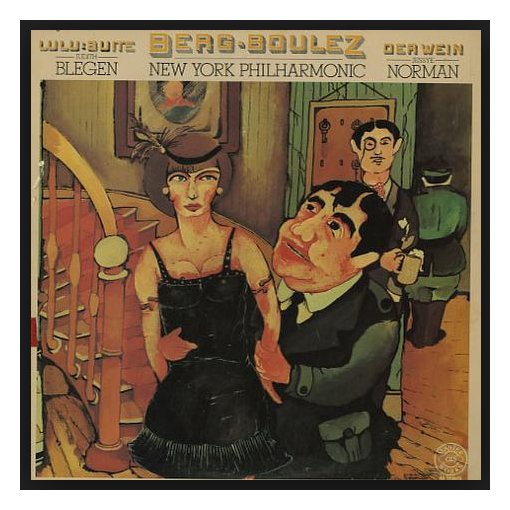 BD: So a role like Lulu, if you were not against
the character, it would be something that you could sing and be happy with?
BD: So a role like Lulu, if you were not against
the character, it would be something that you could sing and be happy with?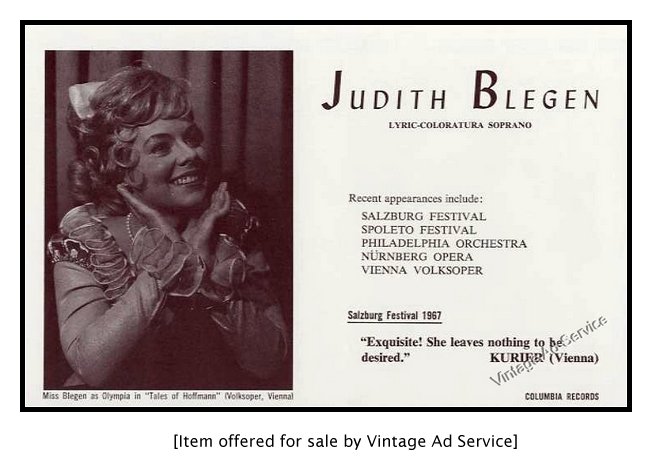 JB: I rather like when
my son comes to visit me. As an assignment I deliberately made myself
watch some MTV. That’s a new medium putting the visual aspect and television
to Rock songs. I don’t have anything against it. I don’t like
malice. I don’t like evil things, but I wonder whether there might
not be some malice there... but I don’t know. Evil is everywhere, as
is goodness. I’m sorry to see so much drug infiltration. What
I don’t understand is why people want to take drugs. I don’t understand
that. Isn’t it enough to be what we were made by our natural creator?
Is that not enough for our one life to live? That’s something I don’t
understand and I’m very sorry to see the references made to drugs and things
like that in Rock music. I’m very frightened by that as a matter of
fact.
JB: I rather like when
my son comes to visit me. As an assignment I deliberately made myself
watch some MTV. That’s a new medium putting the visual aspect and television
to Rock songs. I don’t have anything against it. I don’t like
malice. I don’t like evil things, but I wonder whether there might
not be some malice there... but I don’t know. Evil is everywhere, as
is goodness. I’m sorry to see so much drug infiltration. What
I don’t understand is why people want to take drugs. I don’t understand
that. Isn’t it enough to be what we were made by our natural creator?
Is that not enough for our one life to live? That’s something I don’t
understand and I’m very sorry to see the references made to drugs and things
like that in Rock music. I’m very frightened by that as a matter of
fact.© 1986 Bruce Duffie
This conversation was recorded in Chicago on October 1, 1986.
Portions were broadcast on WNIB in 1991, and again in 1996 and 1998.
This transcription was made in 2016, and posted on this website at that
time.
To see a full list (with links) of interviews which have been transcribed and posted on this website, click here. To read my thoughts on editing these interviews for print, as well as a few other interesting observations, click here.
Award - winning broadcaster Bruce Duffie was with WNIB, Classical 97 in Chicago from 1975 until its final moment as a classical station in February of 2001. His interviews have also appeared in various magazines and journals since 1980, and he now continues his broadcast series on WNUR-FM, as well as on Contemporary Classical Internet Radio.
You are invited to visit his website for more information about his work, including selected transcripts of other interviews, plus a full list of his guests. He would also like to call your attention to the photos and information about his grandfather, who was a pioneer in the automotive field more than a century ago. You may also send him E-Mail with comments, questions and suggestions.